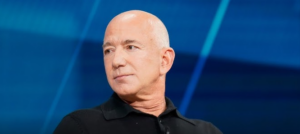In a strategic pivot, the Bezos Earth Fund has discontinued its financial backing for the Science Based Targets Initiative (SBTi), traditionally a key player in assessing corporate emissions in alignment with the Paris Climate Agreement. This decision surfaces as former U.S. President Donald Trump formally exited the Paris Agreement, suggesting an alteration in Bezos' environmental strategy.
Jeff Bezos Halts Funding for Major Climate Initiative Amid Shift Toward Defense Investments

Jeff Bezos Halts Funding for Major Climate Initiative Amid Shift Toward Defense Investments
The Earth Fund's withdrawal from support for SBTi highlights changing priorities in climate initiatives.
Previously, the Earth Fund had been a significant supporter of SBTi, having granted £14.5 million in 2021. This grant, however, was set to expire in 2024, compelling SBTi to seek alternative funding sources for its operations. Reports indicate that the Bezos Earth Fund, alongside advisors associated with former U.S. climate envoy John Kerry, leaned towards advocating for companies to utilize carbon credits—an approach that has stirred controversy regarding its long-term sustainability.
Nevertheless, Bezos remains engaged in various climate-related projects. At a recent New York Times DealBook Summit, he reiterated the pressing need for addressing climate issues. His foundation continues to support initiatives such as the Greenhouse Gas Protocol and the World Resources Institute, signaling ongoing commitment despite the funding withdrawal from SBTi.
In juxtaposition to his climate funding retraction, Amazon is enhancing its involvement in the defense sector. The tech giant has secured a £670,000 consultancy deal with the UK’s Ministry of Defence (MoD) to strategize next-generation space communication systems through its Project Kuiper satellite initiative. This collaboration was discussed with UK Space Command and represents a move towards integrating private satellite networks with military and governmental efforts.
Insiders reveal that Amazon’s Kuiper executives have been particularly active in securing contracts with the UK defense sector, especially in light of the impending launch of advanced communications satellites. The UK government is finalizing bidders for its substantial £5 billion Skynet 6 military satellite program, an initiative drawing interest from major players such as Airbus and Lockheed Martin.
With multiple contracts already secured for Amazon's AWS services within the UK government, the company solidifies its footprint in the digital and defense arena. Competing with Elon Musk's Starlink, Amazon has also received a license from UK telecom regulator Ofcom to offer satellite broadband services in Britain.
As Bezos shifts focus from direct climate funding toward defense and space projects, observers are left pondering the implications of this change in direction. While it remains uncertain if this indicates a fundamental strategic transformation, it is apparent that Bezos' multifaceted influence is expanding in both the environmental and military sectors.
Nevertheless, Bezos remains engaged in various climate-related projects. At a recent New York Times DealBook Summit, he reiterated the pressing need for addressing climate issues. His foundation continues to support initiatives such as the Greenhouse Gas Protocol and the World Resources Institute, signaling ongoing commitment despite the funding withdrawal from SBTi.
In juxtaposition to his climate funding retraction, Amazon is enhancing its involvement in the defense sector. The tech giant has secured a £670,000 consultancy deal with the UK’s Ministry of Defence (MoD) to strategize next-generation space communication systems through its Project Kuiper satellite initiative. This collaboration was discussed with UK Space Command and represents a move towards integrating private satellite networks with military and governmental efforts.
Insiders reveal that Amazon’s Kuiper executives have been particularly active in securing contracts with the UK defense sector, especially in light of the impending launch of advanced communications satellites. The UK government is finalizing bidders for its substantial £5 billion Skynet 6 military satellite program, an initiative drawing interest from major players such as Airbus and Lockheed Martin.
With multiple contracts already secured for Amazon's AWS services within the UK government, the company solidifies its footprint in the digital and defense arena. Competing with Elon Musk's Starlink, Amazon has also received a license from UK telecom regulator Ofcom to offer satellite broadband services in Britain.
As Bezos shifts focus from direct climate funding toward defense and space projects, observers are left pondering the implications of this change in direction. While it remains uncertain if this indicates a fundamental strategic transformation, it is apparent that Bezos' multifaceted influence is expanding in both the environmental and military sectors.




















